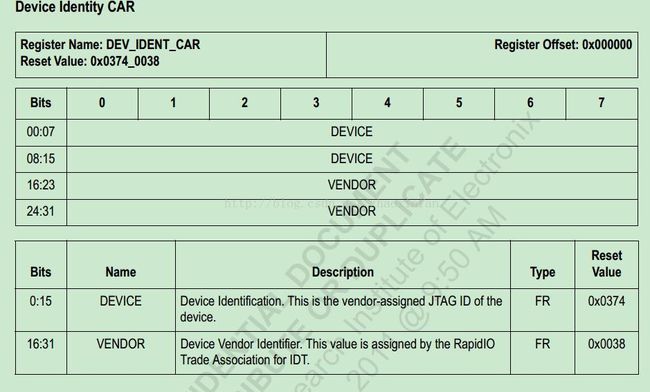Zynq-Linux移植学习笔记之14-RapidIO驱动开发
在对zynq进行linux驱动开发时,除了需要针对zynq内ARM自带的控制器适配驱动外,还需要对zynq PL部分的IP核进行驱动开发。对于ARM来说,zynq PL部分的IP核就是一段地址空间,这段地址空间包含了该IP的一系列寄存器,ARM操作该IP核的寄存器也就是操作这段地址空间,而PL部分IP的驱动也就是对IP寄存器的操作。
1、 硬件设计
在vivado内进行设计时,RapidIO IP核通过AXI总线与ARM相连,地址空间区域如图:
从0x40000000-0x7FFFFFFF均为RapidIO IP的地址空间,注意这里的地址是物理地址,在zynq的裸程序中,可以通过xil_out32()或xil_in32()等函数直接操纵该地址的值,也即对RapidIO IP核寄存器的读写操作。
补充一点,考虑到RapidIO IP使用的一致性以及预防配置出错,硬件设计时已经将RapidIO IP寄存器进行了正确配置,这一部分是在硬件FPGA编程时实现的,软件部分并不需要从头开始配置RapidIO IP核。因此,对RapidIO IP驱动的开发也只需要实现对寄存器的读、写这两个函数即可。
2、 devicetree设计
由于RapidIO IP核位于PL部分,需要在devicetree中增加相应内容,如下:
amba_pl {
#address-cells= <0x1>;
#size-cells= <0x1>;
compatible= "simple-bus";
ranges;
srio_axi_config@40000000{
compatible= "xlnx,xps-rio-1.00.a";
reg= <0x40000000 0x40000000>;
};
};Amba_pl对应PL部分的amba,devicetree中原有的amba对应PS部分,两个位于同一层。
3、 驱动设计
RapidIO IP核驱动实现对物理地址0x40000000到0x7fffffff的读、写操作,可以参考xilinxPL部分CAN IP核的驱动代码。实现过程需要注意地址的虚实转换,0x40000000开始的这一段地址是物理地址,需要将这段地址进行映射,确保CPU访问的地址经过MMU转换后确实对应这一地址。
/*
* rio-xiic.c
* Copyright (c) 2002-2007 Xilinx Inc.
* Copyright (c) 2009-2010 Intel Corporation
*
*/
/* Supports:
* Xilinx RapidIO
*/
#include
#include
#include
#include
#include
#include
#include
#include
#include
#include
#include
#include
#include
#define DRIVER_NAME "xiic-rio"
#define SRIO_ZYNQ_BASEADDR 0x40000000
#define SRIO_ZYNQ_NODE_BASEADDR 0x10100
#define SRIO_ZYNQ_MAX_HOPCOUNT 13
struct xiic_rio {
struct mutex lock;
u8 *data;
};
/* We need global varriable for maped address */
static void __iomem* _rio_base = NULL;
static inline void rio_setreg32(unsigned int addrBase,unsigned int addrOffset,unsigned int value)
{
iowrite32(value, addrBase + addrOffset);
}
static inline int rio_getreg32(unsigned int addrBase,unsigned int addrOffset)
{
unsigned int reg_addr;
reg_addr=addrBase+addrOffset;
return ioread32(reg_addr);
}
static ssize_t hlMaintWrite(unsigned int dstId,unsigned short hopcount, unsigned int offset, unsigned int writedata)
{
unsigned int reg_addr;
if( hopcount > SRIO_ZYNQ_MAX_HOPCOUNT )
{
printk("!!!error, hopcount = %d, > %d\n",hopcount,SRIO_ZYNQ_MAX_HOPCOUNT);
return -1;
}
rio_setreg32((unsigned int)_rio_base,SRIO_ZYNQ_NODE_BASEADDR,dstId);
reg_addr = (((hopcount+1)<<24)|offset);
rio_setreg32((unsigned int)_rio_base,reg_addr,writedata);
return 0;
}
static ssize_t hlMaintRead(unsigned int dstId,unsigned short hopcount, unsigned int offset, void *mrdataAdr)
{
unsigned int reg_addr;
if( hopcount > SRIO_ZYNQ_MAX_HOPCOUNT )
{
printk("!!!error, hopcount = %d, > %d\n",hopcount,SRIO_ZYNQ_MAX_HOPCOUNT);
return -1;
}
rio_setreg32((unsigned int)_rio_base,SRIO_ZYNQ_NODE_BASEADDR,dstId);
reg_addr = (((hopcount+1)<<24)|offset);
mrdataAdr = rio_getreg32((unsigned int)_rio_base,reg_addr);
printk("M_SRIO_MAINT_REG_READ: hopcount = %d, offset = 0x%x, value = 0x%x\n",hopcount,offset,mrdataAdr);
return 0;
}
static SIMPLE_DEV_PM_OPS(xiic_rio_pm_ops, hlMaintRead,hlMaintWrite);
static int xiic_rio_probe(struct platform_device *pdev)
{
struct xiic_rio *rio;
struct resource *res;
unsigned int mtRdata=0;
rio = kzalloc(sizeof(struct xiic_rio), GFP_KERNEL);
if (!rio)
return -ENOMEM;
/* Get Mapped address */
_rio_base = ioremap_nocache(SRIO_ZYNQ_BASEADDR, 0xe000000);
if (!_rio_base)
return -ENOMEM;
res = platform_get_resource(pdev, IORESOURCE_MEM, 0);
platform_set_drvdata(pdev, rio);
hlMaintRead(0xFF,0, 0, mtRdata);
return 0;
}
static int xiic_rio_remove(struct platform_device *pdev)
{
struct xiic_rio *rio = platform_get_drvdata(pdev);
kfree(rio);
return 0;
}
static const struct of_device_id xiic_of_match[] = {
{ .compatible = "xlnx,xps-rio-1.00.a", },
{},
};
MODULE_DEVICE_TABLE(of, xiic_of_match);
static struct platform_driver xiic_rio_driver = {
.probe = xiic_rio_probe,
.remove = xiic_rio_remove,
.driver = {
.name = DRIVER_NAME,
.of_match_table = of_match_ptr(xiic_of_match),
.pm = &xiic_rio_pm_ops,
},
};
module_platform_driver(xiic_rio_driver);
MODULE_AUTHOR("[email protected]");
MODULE_DESCRIPTION("Xilinx Rio IP Core driver");
MODULE_LICENSE("GPL v2");
上面代码中ioremap实现的就是物理地址的映射,该函数的第二个参数为映射的大小,由于模块上DDR只有1G,所以实际最大的映射空间只有224M,能访问IP核的实际地址空间为0x40000000-0x4e000000。驱动中实现读写两个函数,对zynq FPGA地址的访问可以直接调用ioread32()、iowrite32(),这两个函数和xil_out32()、xil_in32()相对应。
完成驱动后修改Kconfig文件和Makefile文件,加入驱动选项,这里是合在了I2C总线驱动里面:
4、 测试
对该驱动的测试主要是通过调用读函数访问地址空间,判断返回值是否符合预期。由于RapidIO IP核能够访问到CPS 1848,可以通过判断返回值是否是1848的device ID加以验证。
在probe中调用函数hlMaintRead(0xFF,0, 0, mtRdata),返回值如下:
Value和1848 datasheet中的一致,验证通过。
5、 总结
在对zynq PL部分IP核的驱动开发过程中需要注意地址转换问题,下面两种异常都是属于地址问题
这种异常是映射空间不够大,对应于ioremap第二个参数






